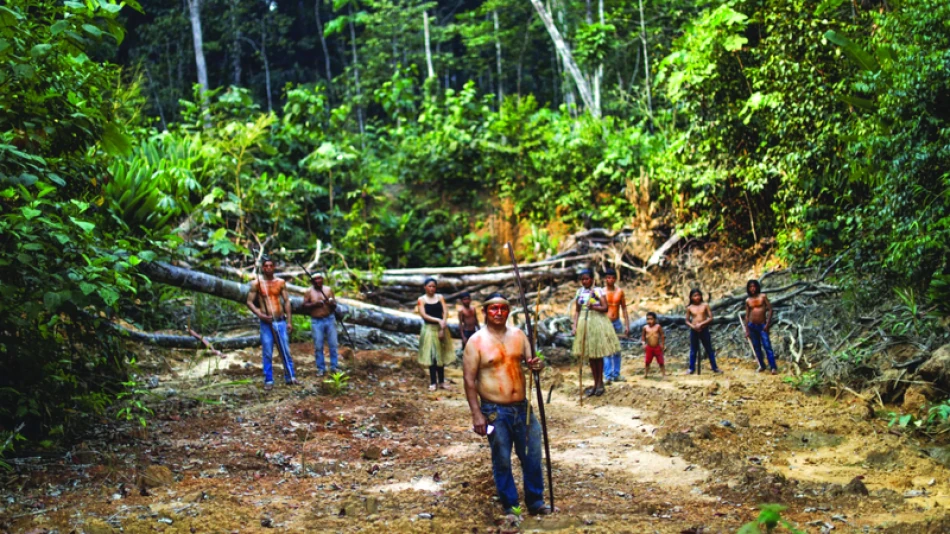
Brazil Protects Crops by Extracting Fertilizers from the Amazon
Deep in the Amazon rainforest, workers are preparing to dig a subway-wide vertical tunnel half a mile underground. They're not looking for gold or oil, but for fertilizer – something arguably just as valuable for this massive agricultural nation. The project highlights Brazil's push for fertilizer independence as global trade tensions reshape agricultural supply chains.
Brazil imports about 90% of the nitrogen, phosphorus, and potash nutrients it needs, mainly from Russia. The war in Ukraine and Western sanctions made these supplies unstable, creating a major vulnerability for the world's largest soybean exporter.
The solution lies beneath the world's largest rainforest. Toronto-based mining company Brazil Potash is investing $2.5 billion to build an underground mine near the town of Autazes, just miles from the Madeira River banks. The mine will tap into one of the world's largest potash deposits in the Amazon basin.
Production at the Autazes mine is set to begin in 2030, with an estimated output of 2.4 million tons annually. All of this production will stay in Brazil, providing nearly one-fifth of the country's fertilizer needs over the mine's 30-year lifespan. The basin contains enough deposits to make Brazil almost self-sufficient in potash fertilizer, which is essential for maintaining soil fertility and crop productivity.
This comes at a crucial time. As global trade tensions intensify, Brazil has replaced a growing share of American agricultural exports to China. China avoided American soybeans in response to tariffs imposed by the Trump administration. Trump's 50% tariffs on Brazil this year have increased risks for the country's agricultural industry, making domestic fertilizer production even more critical.
Having a dedicated potash supply would help protect Brazil's crops from geopolitical shocks like the 2022 Russia-Ukraine war, when potash prices hit record highs and caused panic in the country's agricultural belt. It would also give Brazil an advantage during times when US-China tensions redirect trade flows and increase demand for Brazilian agricultural products.
"We have an important natural resource here, and we need to make the most of it," said Rafael Bloise, the project's head in Brazil. The US-listed mining company plans to establish another site in Fazendinha, near where the Madeira River meets the Amazon River.
Brazil's Fertilizer Dependency
Brazil needs more fertilizer than other major agricultural countries to maintain current production levels. While Brazil enjoys a year-round growing climate, its soil quickly depletes nutrients. The clay-rich soil also struggles to retain fertilizers during heavy rainfall.
Chinese investors have already shown interest in the project, which includes a port terminal and a 102-mile power line. Under a potential swap agreement, Beijing might agree to purchase potash from the mine on behalf of Brazilian farmers in exchange for guaranteed future crop supplies like soybeans and cotton, according to the company.
The project's location in Amazonas state is both a blessing and a challenge. Amazonas borders Mato Grosso, a major fertilizer consumer and Brazil's largest soybean producer, about 400 miles away through dense rainforest.
Trucks already transport Mato Grosso's harvest north to river barges heading to ports on Brazil's Atlantic coast. Once the mine opens, these trucks could return to Mato Grosso's farmland loaded with potash instead of running empty.
"The company is a huge source of agricultural commodities to China, but it's exposed to all these geopolitical risks that affect its fertilizer supplies," said Brazil Potash CEO Matt Simpson. "So having a secure source of potash in your backyard is essential."
Environmental and Cultural Challenges
But digging a giant hole in one of the world's most environmentally and culturally sensitive areas isn't easy, said Bloise, who spent most of his career developing Carajas, the world's largest iron ore mine, also located in the Amazon region.
Brazil Potash spent the past decade fighting legal battles and trying to win support from everyone from the local mayor to the village priest. The company finally got permission to move forward.
The company plans to mine only in areas outside the lands of the Mura, an indigenous community whose territory overlaps with parts of the potash deposits. The Mura people were initially skeptical – since colonial times, they've had to resist violent invasions, first from Portuguese colonizers and more recently from illegal gold miners.
Today, about 35 of the 40 villages in the area support the mine, after the company convinced them with promises of a better future, according to the Mura indigenous council. Brazil Potash invested in a local school and soccer team, and promised to help locals increase income from fish farming, small-scale agriculture, and handicrafts.
In Urucoretuba, the riverside community of about 500 families closest to the mine, poor sanitation has led to health problems. The dock collapses when the river floods, and pirate attacks have become common as drug traffickers move deeper into the Amazon. There's no police presence in the area, and although there's a clinic in town, doctors only visit every two weeks.
"Indigenous communities want what other Brazilians want," said Aldenilson Morais Pavao, the Mura chief in Urucoretuba. "Who doesn't want to drink a cold glass of water from the refrigerator, or own a car, or sleep in an air-conditioned room?"
The Amazon mine highlights the core dilemma Brazil faces regarding the future of the rainforest and its inhabitants, as world leaders gather in the Amazon for the UN Climate Summit. Environmental advocates warn that legal mining could set a dangerous precedent in the Amazon, paving the way for deforestation, land grabbing, and social conflicts.
For Brazil's agricultural sector, though, fertilizer security has become as important as gold and oil for maintaining its position as a global food supplier in an increasingly uncertain world.
Most Viewed News

 Sara Khaled
Sara Khaled






